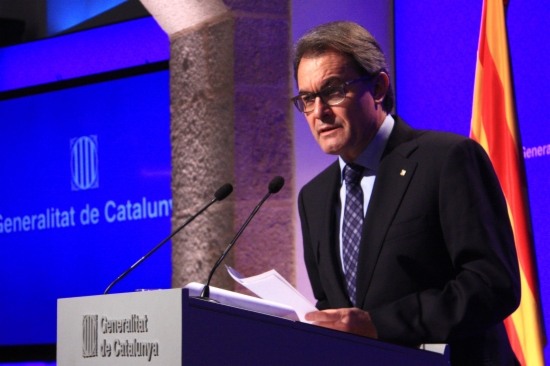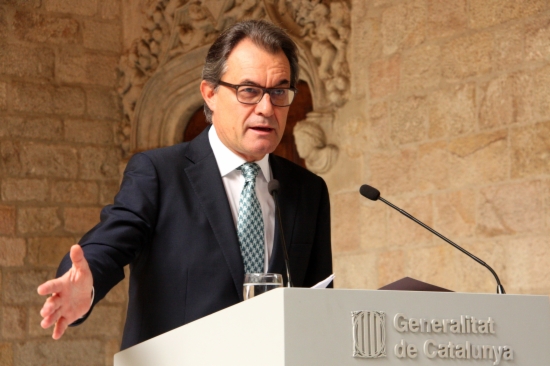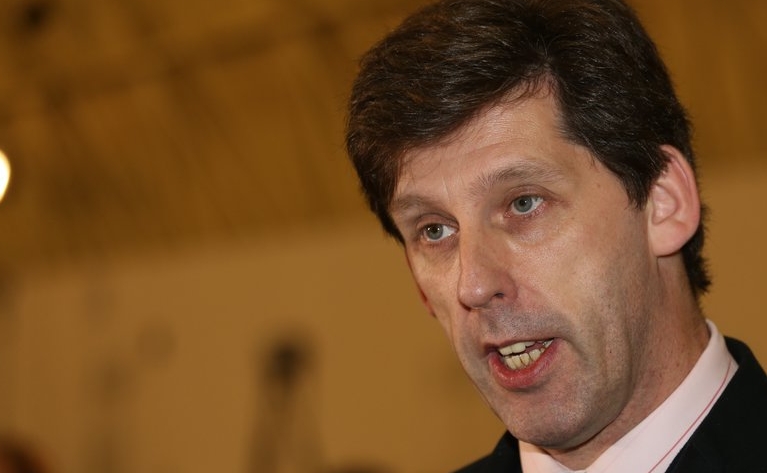14.10.2014 - 14:33
The independence consultation vote will be carried out in Catalonia on November 9 but in different parameters than the ones fixed on December 2013. Catalan president Artur Mas explain it in a press conference this morning: ‘Vote will not happen according to Law of Consultations and the decree I signed, obviously because the Spanish Government has suspended both’. Mas said an alternative vote with a different legal framework will be carried out on the same date: ‘We’re moving forward, not as united, but forward. Commitment means Catalan Government will hold the vote on that date, with ballot boxes and ballots. I would have preferred maximum consensus but it is now not possible’.
A pre-existing, legal citizen participation mechanism
Mas said that the new formula for holding a vote rests on a pre-existing legal mechanism and therefore is not the popular consultation law adopted by the Catalan parliament in September. This mechanism would allow the government to call the vote drawing on a ‘generic concept of promoting citizen participation’ in order to circumvent the central government’s ban. If the legal framework has not been challenged by the Spanish government within the specified period, the Catalan government can use this ‘pre-existing legal framework’ to avoid a legal block. Aside from the popular consultation law it passed in September, the Catalan government has powers in matters of citizen participation. Mas declined to provide further details as to the legal framework that will be used. ‘We shouldn’t make things easier for the central government’ he said.
A pre-existing, legal citizen participation mechanism
Mas said that the formula for holding a vote rests on a pre-existing legal mechanism and therefore is not the popular consultation law adopted by the Catalan parliament in September. This mechanism would allow the government to call the vote drawing on a ‘generic concept of promoting citizen participation’ in order to circumvent the central government’s ban. If the legal framework has not been challenged by the central government within the specified period, the Catalan government can use this ‘pre-existing legal framework’ to avoid a legal block. Aside from the popular consultation law it passed in September, the Catalan government has powers in matters of citizen participation. Mas declined to provide further details as to the legal framework that will be used. ‘We shouldn’t make things easier for the central government’ he said.
Twenty-thousand volunteers deployed, along with civic entities and local governments
President Mas also explained that twenty thousand volunteers will be deployed, with the support of civic organizations and local governments, in order to help carry out the 9-N vote: ‘The government will put in place all the necessary logistics’. With this formula, Mas will avoid exposing civil servants to disciplinary actions and suspensions, which has been one of the red lines for the government throughout the negotiation with pro-consultation parties. The commitment [to holding the consultation] that local governments have expressed over these past weeks will be key in facilitating the logistics of the consultation, Mas said.
Polling stations, ballot boxes, and ballots
‘There will be polling stations, ballot boxes and ballots. All citizens over sixteen years of age will be able to go to a polling station and find ballot boxes’, said Mas, adding that the option to vote will be available to the same people who were expected to vote under the previous mechanism (the popular consultation law and the decree calling the vote). Furthermore, Catalans living abroad, who did not qualify under the criteria of the popular consultation law, will also be able to vote if they are in Catalonia on 9 November. They will be able to register to vote and cast a vote. Catalans living in the rest of Spain but whose official residence is listed as Catalonia on their national identity card will also be allowed to vote, Mas added.
Mas explained his plan in this fashion: ‘In the essential matters, on 9-N the Catalan government intends to take what are substantially the same steps: to have ballot boxes at the polling stations—there will be thousands of ballot boxes at the polling stations—and anyone who wants to vote on the agreed-upon question will be able to, because the ballots will be there. That will be the same. Instead of drawing on a specific legal framework, we will be making use of one of the general powers granted to the Catalan government, which regards citizen participation’.
General Council for Citizen Participation, registry and returns
Mas also pledged to create a general council for citizen participation to oversee the entire consultation process, voting and results, a condition put forth by parties at the meeting yesterday. Party representatives would be directly involved in this council.
In addition to this overseeing council, Mas explained that there would be an on-site voter registry at the polling stations. The reason for not using the official voter registration records is that data protection laws prevent the Catalan government from compiling a list of citizens without their consent. Therefore, voters will be registered just before casting their vote. Citizens must identify themselves with their national identity cards. This will ensure that only those who wish to participate will be in the voter registry.
President Mas explained that votes will be counted and results announced on 10 November, the day after the consultation.
Definitive consultation: elections on a joint list and shared platform
Nevertheless, president Mas said that the final consultation vote will take the form of ordinary elections which will be a de-facto plebiscite on the issue of independence if pro-independence parties run on a joint list and a shared platform. According to Mas, the 9-N vote will have a consultative value, as was already anticipated, and elections will be needed in order to confer legal value on the opinion expressed by citizens on 9-N. Therefore, Mas is not proposing to hold elections as a substitute for the consultation, but as a way of conveying to parliament the democratic mandate to move towards independence.
‘I will call elections the ordinary way, but the parties can transform them into a referendum if they run on a joint list and shared platform, so that everywhere in the world the results can be correctly read as a victory or a defeat.’
No consensus on holding the 9th of November vote as designed and nor on having early elections as an alternative
Parties supporting the self-determination vote scheduled for the 9th of November met on Monday in Barcelona to discuss whether to carry on the consultation vote as it is currently planned or to launch instead an alternative way in order to allow Catalans to have their say on their collective future, in view of the total opposition from the Spanish authorities to the current self-determination process. The meeting ended without concensus.
The left-wing Catalan independence party ERC, which is Catalan president main ally, announced yesterday evening through a press release that does not back the alternative consultation vote Mas proposed. ERC states that, if Catalans cannot hold a self-determination consultation vote, the next step should be early elections and a unilateral declaration of independence. However, they have also added that they will help the Catalan Government to ensure that Catalans can vote.
The Catalan green socialist and post-communist coalition ICV-EUiA stated that they will wait to know Mas’ proposal in order to decide their stance.
The alternative left and radical independence party CUP stressed that they will work to keep the consultation vote on the 9th of November and have organised an assembly this very same night to decide what to do next.
More information on this issue:
Catalan leaders: Consultation vote will proceed (04.10.2014)
International media chides president Rajoy (03.10.2014)
Thousands protest against Constitutional Court independence consultation suspension (30.09.2014)
Constitutional Court temporarily suspends Catalonia’s self-determination consultation (29.09.2014)





